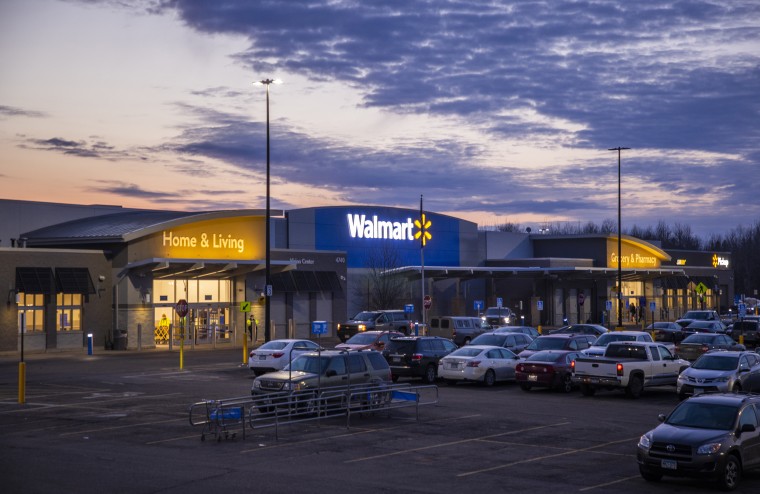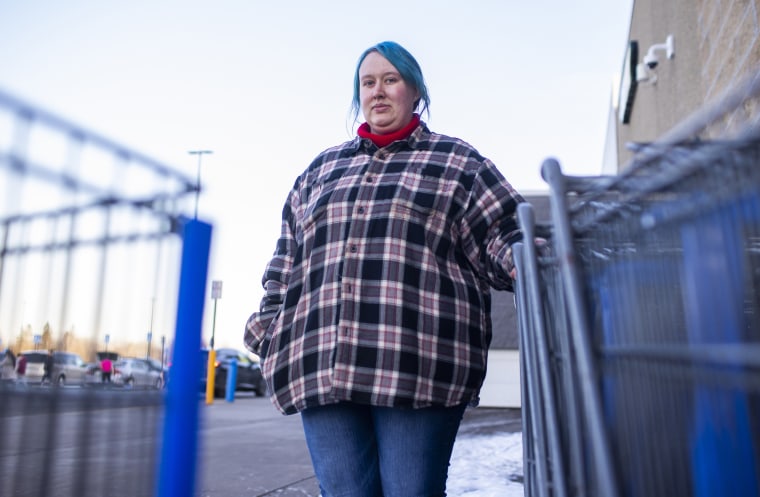Initially deemed “essential,” grocery workers are still putting their lives on the line to restock pantries, but, one grinding year into the pandemic, now say they feel forgotten — by their employers and their customers.
“I feel like they’re treating us like we’re expendable,” said Kellie Ruzich, a 30-year-old mother of three and full-time meat stocker at a Walmart Supercenter near Duluth, Minnesota.
She and her husband don’t make enough to afford day care. He watches the kids during the day, 5-month-old twins with weakened immune systems and a 3 year old. Then they swap and he works overnight at Walmart.
While customers are “encouraged” to wear masks by staffers known as "Health Ambassadors" who are stationed at the front door, many shoppers “brush on by” with no mask, said Ruzich, a member of United for Respect, a nonprofit that advocates for low-wage workers. This comes despite Walmart's policy that all associates and customers wear face coverings and Minnesota's mandate requiring one when indoors and not alone.
When reached for comment on Ruzich’s issues, Walmart company spokesman Casey Staehli told NBC News in a statement: “We are pleased that the vast majority of the 130 million customers who visit us each week are wearing masks. If a customer doesn’t want to wear a face covering, our Health Ambassadors notify a member of management, who will talk to the customer and try to find a solution. We do not want our associates to do anything that could lead to a physical confrontation. We are also working with customers who are unable to wear a face covering due to medical reasons or religious beliefs.”
Ruzich told NBC News that when co-workers tested positive, management did not inform her or her husband, even though one worked near her husband. Ruzich said she’s worried about the risk of bringing home the virus.
“I’ve got medically fragile children at home,” Ruzich said. “With how tiny they are, they aren’t going to do well.”
NBC News asked Walmart about each of Ruzich's claims. Staheli said that Walmart follows "the evolving guidance of public health experts" and that the company's safety measures include "mandatory facial coverings for associates and customers, limiting the hours and number of customers in our stores and clubs, deep cleaning facilities, taking temperature checks and health screenings of associates, installing plastic guards and implementing social distancing measures in all of our facilities."
“We will continue to be proactive in our approach to health and safety and have encouraged associates to do so when away from work,” Staehli said.
Anti-mask views or laxity by some customers have placed workers in the difficult position of balancing personal and store safety with an ethos that "the customer is always right." Five states have already lifted their mask mandate, including Texas and Mississippi, which this week announced the expiration of state-imposed face covering rules. Some businesses in those states have said they will continue to require masks in their stores, ratcheting up the potential for further conflict for employees.

Lives on the line
Despite corporate pledges, more than half of essential workers say they feel forced to sacrifice personal safety to remain employed, according to an online PwC survey in November.
In this uncertain economic climate, workers may be afraid to speak up about workplace conditions for fear of losing their jobs.
Ben Bonnema, a Trader Joe’s employee in New York City, was fired last week, shortly after writing to the company CEO about safety improvements the store could implement, including the installation of CO2 monitors. While Bonnema maintains that the disciplinary action was due to the letter, Trader Joe’s spokesperson Kenya Friend-Daniel told NBC News in an email that the employee's suggestions were previously addressed and that "store leadership terminated this Crew Member’s employment because of the disrespect he showed toward our customers."
“We have never, and would never, terminate a Crew Member’s employment for raising safety concerns,” Friend-Daniel wrote.
Bonnema's letter included citations from several scientists who had written to President Joe Biden last month to urge his administration to increase workplace and school safety measures against the aerosol-borne coronavirus.
Jose-Luis Jimenez, a University of Colorado professor of chemistry and one of the letter's signatories, told NBC News that Bonnema’s letter was “extremely well written” and agreed that stores should install CO2 monitoring devices to analyze air quality and display the results.
Labor activists blasted the firing.
“Trader Joe’s firing an essential grocery worker who bravely spoke out about Covid dangers in stores is a blatant example of corporate intimidation meant to silence workers across the country,” Marc Perrone, international president of the United Food and Commercial Workers International Union, said in a statement.
“Every supermarket in the country must increase worker protections, enforce mask wearing in stores, and commit to disclosing when front-line workers have been infected and died,” Perrone said.
Over 138 grocery workers have died from coronavirus and over 31,000 have been infected or exposed, according to the union’s figures.
OSHA, the federal occupational safety agency in charge of conditions at grocery stores and other workplaces, received more safety complaints in 2020 than the previous year — despite performing significantly fewer inspections, according to a new report by the Department of Labor Office of Inspector General.
Grocers clean up
When lockdowns first hit, stores spent billions on safety measures and bonuses. While some stores permanently raised wages, others temporarily issued increased hazard pay that has since expired.
Amazon said it has invested over $4 billion in Personal Protective Equipment, facility cleaning and higher hourly wages for its warehouse and Whole Foods Market employees since the pandemic began. Albertsons put the total for Covid-related costs at over $885 million. Target increased its starting minimum wage to $15, issued bonuses on top of that, spending over $1 billion in 2020 on safety improvements and worker compensation. Kroger said it has invested over $1.5 billion in worker compensation and safety.
"We’re super proud of the hourly rate of $15.50 an hour, plus the $5 per hour in benefits," Kroger CEO Rodney McMullen told CNBC in an interview on Thursday. "We continue to invest in our associates to keep them safe."
In late February, Costco said it would end hazard pay and increase its starting minimum wage to $16.
“I want to note, this isn’t altruism,” Costco CEO Craig Jelinek said during a Senate Budget Committee hearing, led by $15 minimum wage proponent Sen. Bernie Sanders, I-Vt., where he announced the change. “At Costco, we know that paying employees good wages and providing affordable benefits makes sense for our business and constitutes a significant competitive advantage for us.”
In mid-February, Walmart announced it was increasing pay for 425,000 digital and stocking workers, increasing its hourly workforce average wage to $15.25. But minimum wage remains at $11 an hour for many other positions.
Windfall profits
Grocery stores have reaped “windfall profits” during the pandemic as customers stock up and cook more at home while avoiding restaurants, according to a report by the left-leaning Brookings Institution.
The grocery retail sector experienced a nearly 20 percent increase in profits while raising hazard pay an average of $1.10 per hour, according to analysis from Brookings. That hazard pay ended in June for most. Meanwhile, many of the companies have used the profits to engage in stock buybacks.
Stores say they’re committed to employee and customer safety while juggling increased operational costs, which can vary by region, and the challenges due to the pandemic’s impact on demand and disrupted supply chains.
After Seattle passed a law requiring supermarkets above a certain size to issue hazard pay, Kroger closed two underperforming stores there in mid-February.
"Those stores were marginal already. We thought that closing them was the best long-term decision," McMullen told CNBC. "We operate on razor-thin profits."
The company is instead focused on getting priority access to vaccines for its workers, Kristal Howard, a company spokesperson, told NBC News in a statement.
Grocery workers say they are left trying to muscle through, even when encountering “anti-maskers'' and “maskholes,” said Kathleen Scott, a 55-year-old cashier at an Albertsons in Los Angeles. For many workers, their hours have been cut, reducing take-home pay; and any extra sick time has likely been used up already, she said.
If a worker knows or thinks they’ve been exposed, they don’t have many options.
“Supermarkets are local, we know our customers' names. We don't want to risk their safety — but we simply can't afford to stay home,” Scott said.
“We have to feed ourselves and pay rent. So we don't get tested, and we pretend everything is OK.”

